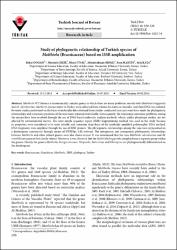Study of phylogenetic relationship of Turkish species ofMatthiola (Brassicaceae) based on ISSR amplification
Abstract
Matthiola W.T.Aiton is a taxonomically complex genus in which there are many problems, mostly with Matthiola longipetalaand M. odoratissima. Matthiola species native to Turkey were collected from various locations in Anatolia, and their DNA was isolated. Revision studies performed on the basis of molecular data obtained from studies conducted in recent years have made the phylogenetic relationships and systematic positions of the taxa more apparent and reliable. Consequently, the remaining taxonomic problems among the species have been resolved through the use of DNA-based molecular analysis methods, which, unlike phenotype studies, are not affected by environmental factors. The inter-simple sequence repeat (ISSR) fingerprinting method was used in the study because its properties were considered to be more reliable and consistent than those of the randomly amplified polymorphic DNA method. DNA fragments were amplified through the use of ISSR primers. The phylogenetic relationships among the taxa were represented on a dendrogram constructed through means of NTSYSpc 2.02 software. The infrageneric and intergeneric phylogenetic relationships between Matthiola and other related genera were also characterized. It was determined that the taxa Matthiola odoratissima and M. ovatifolia are separate but closely related. Moreover, it was observed that the Matthiola longipetala complex forms a separate group within the genera. Clearly, the genera Matthiola, Sterigmostemum, Strigosella, Malcolmia, and Chorispora are phylogenetically differentiated on the dendrogram. Matthiola W.T.Aiton is a taxonomically complex genus in which there are many problems, mostly with Matthiola longipetalaand M. odoratissima. Matthiola species native to Turkey were collected from various locations in Anatolia, and their DNA was isolated. Revision studies performed on the basis of molecular data obtained from studies conducted in recent years have made the phylogenetic relationships and systematic positions of the taxa more apparent and reliable. Consequently, the remaining taxonomic problems among the species have been resolved through the use of DNA-based molecular analysis methods, which, unlike phenotype studies, are not affected by environmental factors. The inter-simple sequence repeat (ISSR) fingerprinting method was used in the study because its properties were considered to be more reliable and consistent than those of the randomly amplified polymorphic DNA method. DNA fragments were amplified through the use of ISSR primers. The phylogenetic relationships among the taxa were represented on a dendrogram constructed through means of NTSYSpc 2.02 software. The infrageneric and intergeneric phylogenetic relationships between Matthiola and other related genera were also characterized. It was determined that the taxa Matthiola odoratissima and M. ovatifolia are separate but closely related. Moreover, it was observed that the Matthiola longipetala complex forms a separate group within the genera. Clearly, the genera Matthiola, Sterigmostemum, Strigosella, Malcolmia, and Chorispora are phylogenetically differentiated on the dendrogram.
Source
Turkish Journal of BotanyVolume
40Issue
2URI
http://www.trdizin.gov.tr/publication/paper/detail/TWpFME16QXhNUT09https://hdl.handle.net/11421/12305


















